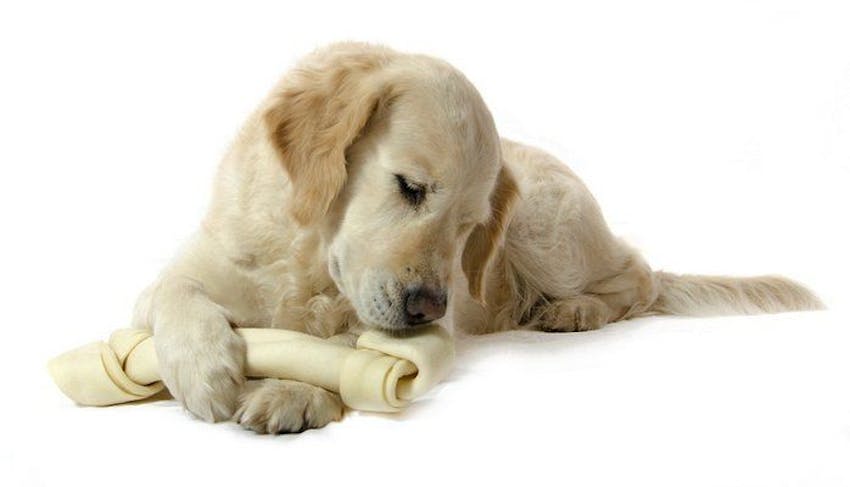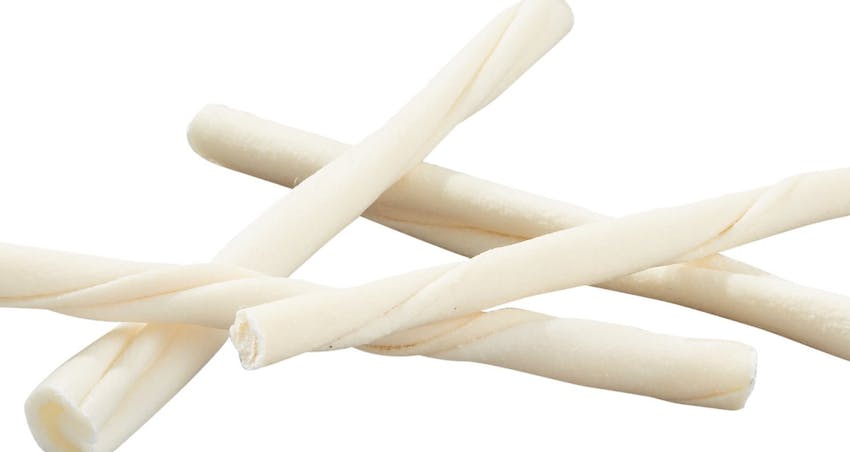Is Rawhide Bad for Dogs?
By: Brianna Gunter / Published Feb 16, 2022
You’ve seen rawhide chews in pet stores, and maybe you’ve even watched your pooch chew gleefully on a few. However, it doesn’t take too much searching to see that many people insist rawhide is a delicious but dangerous deathtrap for dogs. On the flip side, you may also see rawhide touted as a natural, healthy chew that cleans dogs’ teeth and enables dogs to have pro-longed chewing session.
With such differing opinion on rawhide and dogs, it’s easy to be confused about whether or not you should stock up. Talking with your veterinarian is the best course of action, but going through this list of rawhide FAQs will also help you get to the bottom of things.
What is rawhide anyway?
Though it often comes in a bone shape, rawhide is really the skin, or hide, of an animal. Whereas the top layer of animal hide is usually tanned or treated to make leather, rawhide comes from the inner layer and is untanned. The majority of rawhide dog chews come from cattle hide, but you can also find versions from buffalo, deer, pig, and other livestock animals. In addition to the traditional bone shape with a thick knot at each end, rawhide can be twisted and braided into a wide variety of shapes and different sizes.
Now, it’s important to be aware that not all rawhide products are created equal. Most involve leftover animal hides from the leather industry, which often uses skins that have been sitting for weeks or even months in salt brines for preservation. The skins may also be treated with chemicals or bleached prior to being used for rawhide.
Is rawhide dangerous for dogs?
Many rawhide chew brands claim that their product is perfectly safe and even beneficial when used properly. There may be some truth to this, particularly if the rawhide was used quickly after being harvested from the animal, is unbleached, and has not been treated with harmful chemicals. However, most veterinary sources agree that there is still some danger to be wary of.
“The two main concerns with rawhide are potential for choking or intestinal tract blockage, and contamination with chemicals or bacteria,” says Dr. Sarah Nold, Trupanion veterinarian. “There were arsenic contaminated chews many years ago. More recently, bacterial contamination (campylobacter and salmonella) is a bigger issue.”
Sure enough, the Food and Drug Administration has highlighted various rawhide recalls over the years due to both chemical and bacterial concerns. And in 2017, United Pet Group issued a recall after levels of a quaternary ammonium compound (a cleaning chemical for food processing equipment) were discovered in its rawhide products.
The good news is that cases of dogs getting sick as a result were limited, but the correlation remained.
Can dogs digest rawhide?
Since chemical and bacterial contaminants are such a concern, does this mean pet owners can mitigate risks by choosing “natural” or “unbleached” rawhides? Not necessarily. According to the American Kennel Club (AKC), the main risk with rawhide actually comes down to the dog’s chewing habits and their ability to digest it.
While meat and animal skin in general are very digestible, rawhide is not easily broken down in a dog’s stomach. This means that a buildup of smaller pieces or larger break-offs can cause an obstruction anywhere along your dog’s digestive tract. However, slower, gentle chewing can help. Pet owners should also immediately pick up any pieces torn off of a rawhide bone.
As the AKC states, “dogs that truly take their time chewing on rawhides and do not swallow large pieces” are less likely to have digestive issues.
What about the dental benefits of rawhide?
The scraping of rawhide against teeth does act to remove tartar and plaque buildup during chewing.
But while many tout the dental benefits of rawhide, the chew can cause harm to the gums and mouth if it breaks into sharp pieces.
Much of the risk here still depends on how aggressively a dog chews, and many canine teeth do go through rawhide bones free from injury. But before you jump to give your gentle muncher his own rawhide, know that things also depend on the consistency of the chew itself.
“Some rawhides, along with other treats and toys sold for dogs to chew on, are quite hard and could cause a fractured tooth or teeth when chewed on,” Nold explains.
Key rawhide health concerns
With all the warnings issued over the years about rawhide and dogs, health concerns to remember are:
- Choking
- Other digestive blockages
- Digestive irritation
- Chemical contamination
- Bacterial contamination
- Dental irritation or injury
Nold also points out that rawhide is high in protein and salt, which may not be suitable for dogs with certain health conditions.
Can dogs chew rawhide safely?
In spite of all the concern, rawhide remains a popular pet chew product on the market today. For one thing, it tends to last longer than many other types of dog chews. Dogs also generally appear to enjoy the taste of rawhide, and the chews can provide many hours of playful activity.
But before you give your dog any new type of chew, rawhide or not, it’s important to discuss it with your veterinarian first. Due to the known risks, it shouldn’t come as a surprise if they suggest other options. “In general though, most veterinarians recommend avoiding rawhide or pressed chews,” Nold says.
How can I find safe alternatives to rawhide?
There are numerous alternatives that provide both the dental benefits and chewing stimulation that rawhide is popular for. While they may not last as long, these products are safely digestible. However, it can be tricky to actually distinguish them from other chews. Be on the lookout for:
- Follows the “knee knock” rule (if it’s so hard you wouldn’t knock it against your knee, don’t give it to your dog)
- Other digestive blockages
- Chews that aren’t “pressed” (condensed for harder density, which can break into sharp pieces)
- Beef and chicken-based chew alternatives that don’t contain animal hide
It’s also a good idea to research each brand before buying as well as ask your veterinarian for recommendations. A 2019 study of 10 different dog chews labeled “rawhide-free” on their packaging found that two did in fact contain rawhide after all.
Protect your dog
Always limit dogs to only recommended quantities, and remember to consult with your veterinarian about any new dog treat or chew. Additionally, remember that just because something isn’t rawhide, that doesn’t mean safety precautions shouldn’t be in place.
“Any treat carries a risk of choking if it’s the wrong size or it is chewed down to become the wrong size,” Nold says. “For this reason, I think it is a good idea whenever a dog is chewing on a treat that they are supervised until it is gone. Some dogs try to swallow them whole.”.
Even with the best safety measures in place, dogs can be unpredictable. There’s no time like the present to learn how dog medical insurance can help protect your pal.



